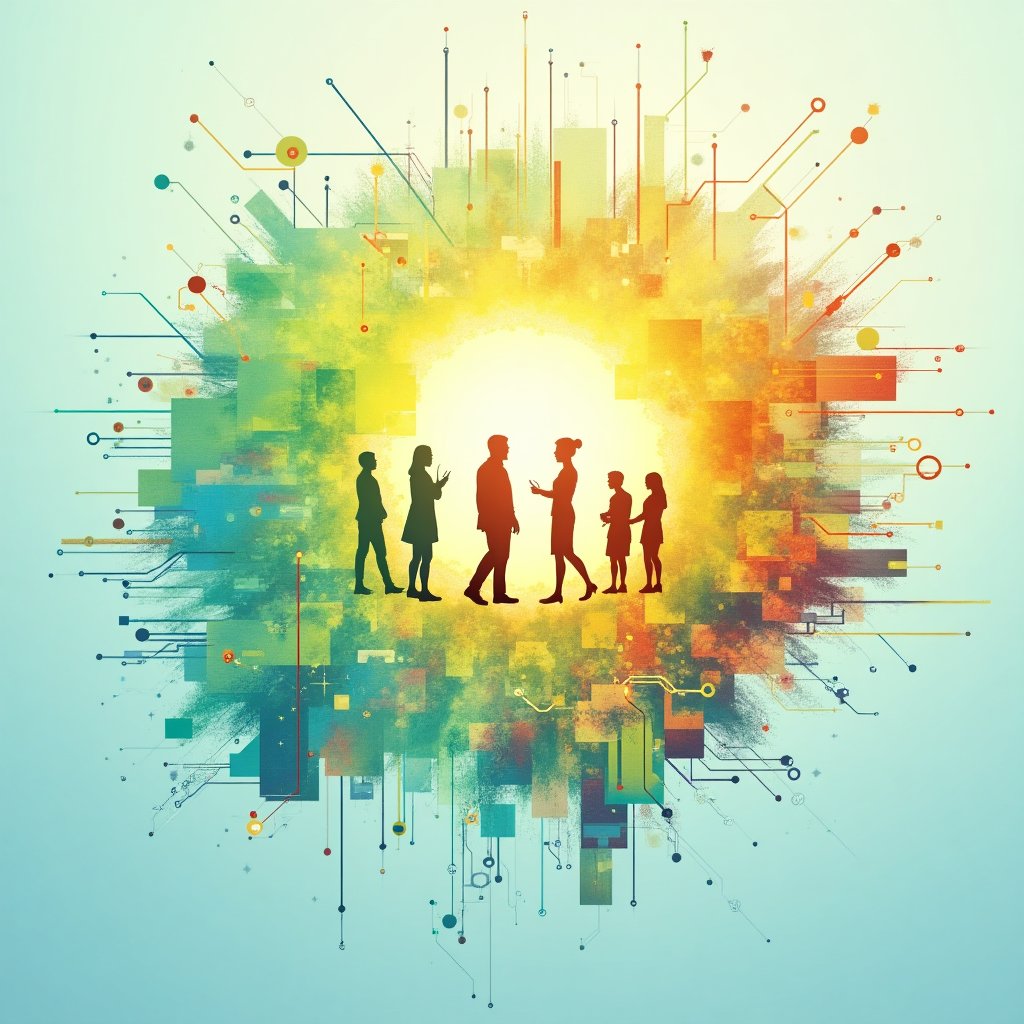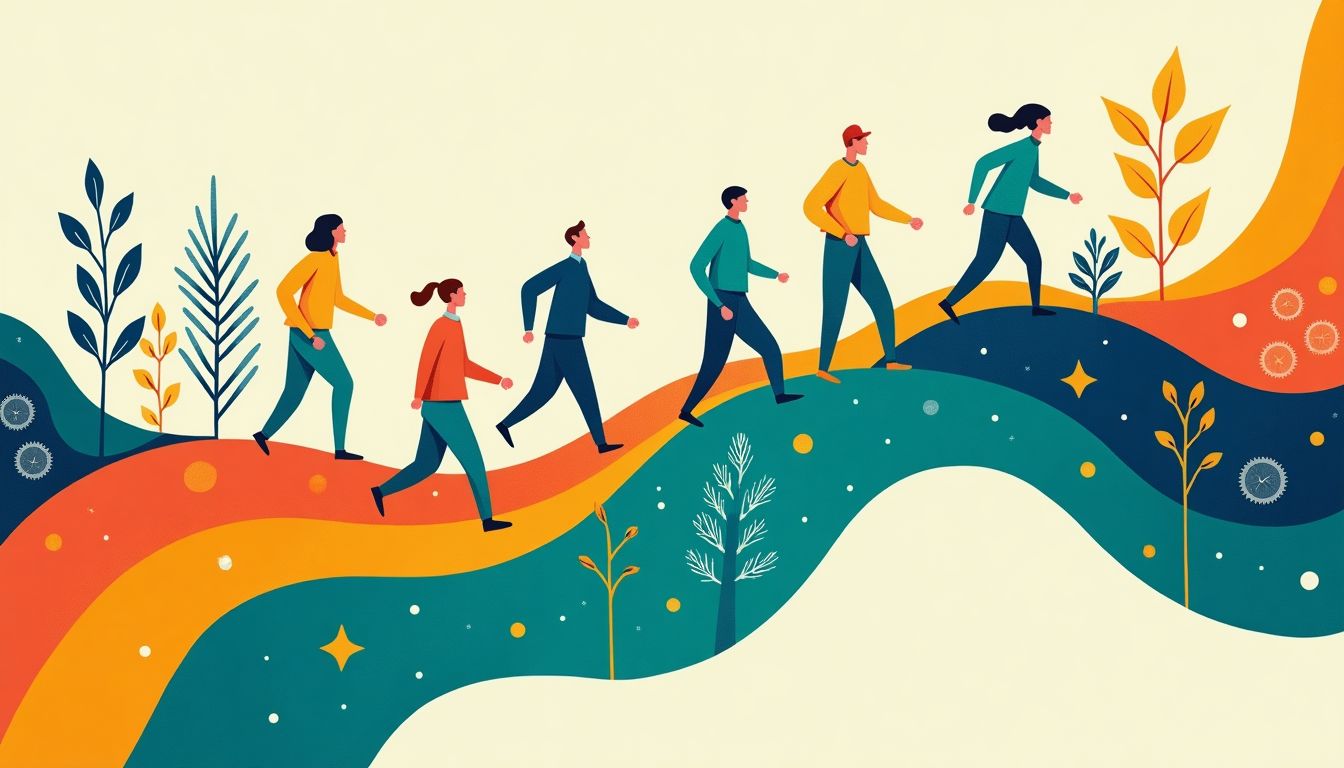Introduction: The Will to Live in a Post-Work World
The only thing we have to fear is fear itself. – Franklin D. Roosevelt. This well-known quote serves as a paradoxical touchstone for our growing existential crisis as we stand on the edge of a future that promises a radical reduction of labor. If fear has been our constant companion in the struggle for survival, what happens when survival itself stops being a struggle? The advent of artificial intelligence and automation could free us from menial tasks, leading to a world where the daily grind is but a distant memory. However, as we cloak ourselves in this new shield of convenience, we can't help but wonder: will we rise to the occasion, or will we fall into a morass of boredom? Can we still find the will to live in a world where struggle is obsolete?
This question isn’t just academic; thinkers like Viktor Frankl, who explored meaning amidst suffering, and Friedrich Nietzsche, who lifted the lessons of struggle into the realm of strength, provide insight into this baffling scenario. Moreover, modern researchers like Angela Duckworth, famous for her work on grit, hint that the persistence we’ve valued so deeply might be at risk of vanishing. So, as technology unfolds its benevolent wings, we must explore what might sprout in the absence of struggle.
Are we on the brink of a golden age of creativity and fulfillment, or are we simply preparing for a grand existential couch potato moment? The promises of a post-work world are enticing and masterfully wicked, leaving us to ponder if we can truly thrive without the push and pull of labor.
1. Historical Context: The Role of Struggle in Human Development
Throughout our history, humanity has been shaped by the struggle for survival. From our ancestors hunting for food to modern-day workers toiling nine-to-five, struggle has defined our existence. But have you ever stopped to consider how this struggle has actually forged our societies, values, and identities? It's almost like the stubborn underdog story we all root for in movies, except it feels curiously connected to our day-to-day lives.
1.1 The Evolution of Work
As we delve further into our historical narrative, we see work has transitioned from mere necessity to a core part of our identities. Once upon a time, people worked to survive—now, it seems, they work to express who they are. But what happens in a post-work society when the very thing that has defined us for centuries is deflated like a sad balloon? Do we lose our sense of self, or do we rise like a phoenix to redefine the essence of human contribution?
1.2 Philosophical Perspectives on Struggle
Diving deeper, we can’t ignore the philosophical musings on struggle. Friedrich Nietzsche championed the idea that what does not kill us makes us stronger, suggesting that struggle is a catalyst for growth. Meanwhile, Jean-Jacques Rousseau argued that civilization creates artificial struggles that corrupt our natural joy. So, if we subtract struggle from our equation, do we erase our growth narrative altogether, or do we find a new, more fulfilling story to tell? This part of our exploration isn’t merely academic; it's essential for untangling our identities in a future that could be so markedly different.
2. Psychological Implications: Thriving vs. Languishing
As we ponder the question of survival without struggle, we dive into our minds and emotions. It turns out that the human psyche is a complex maze where motivation and happiness can sometimes feel like playing a game of hide and seek. In a world that takes away the traditional struggles of work, we must explore how this shift might impact us psychologically. One theory that sheds light on this topic is Maslow's hierarchy of needs. Picture it like a pyramid, where we climb higher to reach goals that fulfill our basic cravings. But what happens when the foundation of that pyramid—'work'—is taken away? We might find ourselves asking some deep questions about our purpose.
2.1 The Concept of Meaning-Making
Imagine a person, let’s call her Sarah. Sarah was known for her hard work at a marketing agency. When her job disappeared due to automation, she felt lost. Viktor Frankl, a brilliant psychiatrist, believed that even in the worst of situations, we can find meaning. Frankl’s work can help us think: can joy and purpose exist outside of our jobs? In Sarah’s case, she eventually discovered a passion for gardening, which provided her a new sense of fulfillment. In a post-work world, we need to find creative ways to create meaning, and perhaps even start a gardening club! The philosophical ideas of meaning-making offer a lifeline in murky waters.
2.2 Potential for Mental Health Decline
Now, let's get real. Studies show that when people lack purpose, many struggle with conditions like anxiety and depression. A community where everyone is just hanging around all day without purpose can be a breeding ground for “Netflix and chips” syndrome. One study published in The American Journal of Psychiatry indicated that people who lack meaningful activities are at a higher risk for mental health issues. Without the struggles of work, many may find themselves grappling with diminished motivation and a sense of isolation. To combat this, we must rally together to create new forms of engagement and support, like book clubs or painting classes, and rediscover the joy of human connection.
3. Sociocultural Adaptations: Redefining Community and Identity
As we transition to this post-work reality, our communities and identities may undergo significant shifts. Gone are the days when work defined who we are. Instead, we’ll have to explore new identities and cultural norms that flourish outside the office. Picture a world where you're not known for your job title but for your vibrant community contributions—like that guy who makes the best hot sauce or the lady who leads the neighborhood yoga group. These emerging social norms will steer how we view ourselves and each other.
3.1 Emergence of New Social Norms
With the concept of work changing, communities may start to embrace different social norms. We could see a rise in collaborative efforts, where people come together to share skills and passions. Need someone to help you paint your house? You might find a group of friends willing to lend a hand with pizza as payment. This cultural pivot can transform neighborly connections into a support system, paving the way for stronger bonds. Check out local community centers or websites like Meetup to find like-minded folks in your area!
3.2 The Role of Volunteering and Contribution
In a post-work world, volunteering can emerge as a vital form of fulfillment. The act of giving back helps us form connections and find purpose. From feeding the homeless to participating in local cleanups, communities can create opportunities for service. According to the VolunteerMatch website, people who volunteer often experience increased happiness. So, instead of waiting for your worth to be defined by a paycheck, you could redefine yourself through meaningful contributions, like championing a tree-planting initiative in your neighborhood. Who knew saving the planet could come with so many warm fuzzies?
4. Philosophical and Existential Questions: What Constitutes a Good Life?
As we dive deeper into the essence of a fulfilling life in a world where struggles are minimized, we confront profound questions about what it means to live well. The age-old idea of a "good life" often hinged on overcoming challenges and achieving success through sweat and tears. But when the struggle fades, how do we define fulfillment? Can a good life exist without hardship, or is struggle a necessary ingredient in the recipe of existence?
4.1 The Search for Fulfillment
What does fulfillment mean when survival is not a daily concern? Philosophers throughout history have offered various interpretations of a fulfilled life. For instance, Aristotle believed fulfillment was attained through the cultivation of virtues, while utilitarian thinkers like Jeremy Bentham argued that pleasure and the reduction of pain led to a good life. In a post-work society, these views might need revision.
Here are some interpretations of fulfillment that could reshape our understanding:
- Virtue Ethics: Emphasizes moral character and virtues, guiding individuals toward personal growth.
- Hedonism: Suggests that seeking pleasure and enjoying experiences can lead to fulfillment.
- Existentialism: Argues each person must create their meaning and purpose in life, regardless of external circumstances.
As we consider these perspectives, it becomes clear that understanding fulfillment in a post-work world may involve reinventing our values and focusing more on personal development and joy.
4.2 Existential Dread vs. Joy
As individuals find themselves in an environment with less external struggle, they might encounter a unique paradox: the fear of having no purpose. Existential dread, a term coined by existentialists like Jean-Paul Sartre, can stem from an overwhelming sense of aimlessness when traditional milestones are removed. The absence of defined struggles may lead us to question, "What then is my purpose?"
However, the potential for joy can emerge from this existential questioning. The challenge lies in forging a meaningful existence amid uncertainty. Here’s how individuals might navigate this tension:
- Awareness: Recognizing feelings of dread can be the first step in redefining purpose.
- Acceptance: Embracing the unknown can free individuals to explore new passions and interests.
- Connection: Building supportive communities can provide a sense of belonging and shared purpose.
The absence of traditional struggles opens doors for introspection and growth, leading to opportunities for joy, creativity, and deepened human connections.
5. Practical Solutions: Finding Meaning Beyond Struggle
As we venture further into this uncharted territory of a post-work world, the focus shifts to practical strategies that individuals and societies can adopt to find meaning and purpose beyond traditional labor. The good news is that a world where struggle is minimized doesn’t have to mean a lack of fulfillment. Instead, it could pave the way for exciting new pathways to explore what gives our lives meaning.
5.1 Creativity and Self-Expression
Encouraging creativity is essential to fostering a sense of purpose in a post-work world. Engaging in artistic pursuits, whether it’s painting, writing, or music, allows individuals to express their innermost thoughts and emotions. In a society where work no longer defines us, embracing creativity can fill the void.
Consider these forms of creative self-expression:
- Art: Visual art can help communicate complex feelings that might otherwise remain unexpressed.
- Writing: Journaling or storytelling offers an outlet for reflection and imagination.
- Performance: Music, dance, or theater can foster connections with others and oneself.
By fostering creativity, individuals can engage with their deeper selves, leading to profound feelings of fulfillment and connection. A study from the [American Journal of Public Health](https://ajph.aphapublications.org/doi/full/10.2105/AJPH.2016.303209) found that creative activities can have a significant impact on mental health by reducing stress and enhancing happiness.
5.2 Lifelong Learning and Personal Growth
Another critical strategy is to promote a culture of lifelong learning. In a post-work world, the drive to acquire new knowledge and skills can provide intellectual stimulation and a renewed sense of purpose. Opportunities for learning can manifest in various forms, including:
- Formal Education: Enrolling in classes at local community colleges or universities.
- Online Courses: Platforms like [Coursera](https://www.coursera.org/) and [edX](https://www.edx.org/) offer flexible learning opportunities.
- Workshops and Seminars: Engaging in community-sponsored workshops can connect individuals with shared interests.
Lifelong learning encourages personal growth and adaptability, aiding individuals in discovering new passions while creating social bonds. As the [World Economic Forum](https://www.weforum.org/) highlights, continuous learning and skill development will be crucial as the job market evolves.
By embracing creativity and a thirst for knowledge, we can navigate the realities of a post-work world and cultivate purpose beyond the grind of traditional labor.
6. AI Solutions: How Would AI Tackle This Issue?
Artificial Intelligence (AI) has the potential to reshape the human experience dramatically in a post-work world. By tapping into vast datasets on human behavior and emotional well-being, AI can pinpoint what drives fulfillment beyond traditional roles. Here's how AI could contribute to ensuring that the human spirit not only endures but flourishes:
6.1 Personalized Engagement
AI technologies can analyze our passions, hobbies, and preferences, offering tailored suggestions for activities that align with individual interests. Imagine an AI assistant that not only schedules your day but also recommends art classes, community service opportunities, or mindfulness practices based on your mood and aspirations. This personalized approach could ensure that every person maximizes their potential for joy and engagement.
6.2 Mental Health Support
AI-driven platforms could serve as valuable allies in addressing existential concerns. By offering relatable content, therapeutic interactions, and virtual support communities, these tools could help individuals navigate their emotional landscapes in a world where traditional struggles are diminished. Programs like Wysa, which utilize AI for mental health support, already exist, showing promise in this area.
6.3 Purpose-Driven Programs
With the elimination of job-related structures, it's crucial to foster a sense of community and engagement. AI can help design and implement programs that facilitate collective projects, volunteering opportunities, and community enhancement initiatives. By harnessing AI's analytic capabilities, organizations can pinpoint unmet community needs and volunteerism areas, thus bolstering social bonds among individuals. For example, platforms like VolunteerMatch can be upgraded using advanced algorithms to match volunteers instantaneously with community needs.
6.4 Monitoring and Feedback Loops
AI systems could establish feedback mechanisms to evaluate the effectiveness of various initiatives aimed at enhancing well-being and meaning in the absence of traditional work. By leveraging machine learning, these systems could continuously analyze data on user interactions, perceptions of happiness, and community engagement, helping organizations iterate and optimize their approaches effectively. The capabilities of AI platforms like Datawrapper allow for clear visual representations of data that can aid in these discussions.
6.5 Research and Data Analysis
AI can aggregate and analyze research data related to happiness, fulfillment, and societal trends, providing actionable insights for policymakers to structure a supportive framework. Understanding the behavioral patterns emerging in a post-work society will be key to maximizing individual potential and nurturing community well-being. Corporations and institutions could leverage tools like IBM Watson to analyze extensive datasets for relevant patterns and trends.
Actions Schedule/Roadmap (Day 1 to Year 2)
Day 1: Assemble a diverse task force comprising psychologists, sociologists, educators, technologists, and AI specialists. Establish objectives to evaluate the challenges and opportunities within a post-work society.
Day 2: Conduct a comprehensive survey to assess public perceptions on purpose, fulfillment, and identity in a post-work world. Reach out to organizations like the Pew Research Center for benchmarking data.
Day 3: Hold workshops with thought leaders such as Dr. Jordan Peterson and renowned psychologists to discuss meaning-making strategies.
Week 1: Analyze the data collected from surveys to uncover prevailing themes regarding meaning and fulfillment. Utilize AI tools to facilitate deeper insights.
Week 2: Develop an AI-based platform designed to aggregate qualitative data on happiness factors from both individual users and community engagements.
Week 3: Start facilitating community dialogues that explore concepts of purpose in a post-work society. Initiate meetings at local community centers or online forums.
Month 1: Collaborate with academic institutions, including Harvard and Stanford, to conduct research into the implications of a post-work lifestyle on mental health and social structures.
Month 2: Launch community-based programs that encourage creativity, personal growth, and skill-sharing. Facilitate events that promote hobbies or interests beyond traditional work.
Month 3: Assess the initial impact of community programs through surveys and AI tools, adjusting strategies to enhance community engagement and satisfaction.
Year 1: Publish findings and actionable frameworks from the research and community programs, making them publicly available for institutions and organizations worldwide.
Year 1.5: Host an international conference to showcase successful projects, sharing experiences and discussing new strategies addressing the challenges of a post-work world.
Year 2: Launch a pilot program leveraging AI for community engagement initiatives across various regions, measure outcomes, and adjust based on feedback.
Conclusion: Finding Purpose in a Post-Work World
As we edge closer to a post-work world, we find ourselves at a critical juncture—one that compels us to redefine what it means to live a fulfilling life. The absence of struggle poses both a challenge and an opportunity, pushing us to explore realms of creativity, social connection, and shared purpose that lie beyond traditionally valued work pursuits. In this landscape, technology doesn’t merely serve as a tool; it becomes a vital ally that can help us uncover new dimensions of human experience and shared fulfillment. By intentionally cultivating meaning and fostering community, we shape an existence where the human spirit not only survives but thrives, creating a society rich in connection and collective purpose. Together, we can discover ways to flourish in the absence of traditional struggles, embracing the potential for growth and joy that lies ahead.
FAQ
- What is a post-work world?
A post-work world is where traditional jobs are less common because technology like automation and artificial intelligence (AI) take over many tasks. This change means people may rely less on jobs for income and identity. For more insights on automation, check out [Automation.org](https://www.automation.org/) for updated trends.
- Can humans truly thrive without struggle?
Thriving without struggle can mean finding new ways to feel fulfilled. While struggle has traditionally been linked to growth, people can seek meaning through creativity, community activities, and personal growth. The [Viktor Frankl Institute](https://www.viktorfranklin.org/) provides details on finding purpose in life, even in challenging times.
- How can AI help in a post-work scenario?
AI can assist in many ways. Here are a few examples:
- Personalized Engagement: AI can suggest activities based on your personal interests, helping you stay engaged.
- Mental Health Support: AI-driven platforms might help address feelings of anxiety or loneliness by connecting people to resources and support.
- Purpose-Driven Programs: AI can help create volunteer programs that encourage community participation.
For more on how AI is reshaping lives, visit [AI for Good](https://aiforgood.itu.int/) for inspiring stories.
- What steps can individuals take to find meaning beyond work?
Finding meaning in a post-work world involves actively exploring new interests. Here’s how:
- Engage in Creative Hobbies: Creativity can be an outlet to explore your identity.
- Focus on Lifelong Learning: Taking classes or learning new skills can help you grow as a person.
- Get Involved in Your Community: Volunteering or joining local groups can foster connections and provide a sense of purpose.
To learn more about finding fulfillment outside of work, take a look at [Mind Tools](https://www.mindtools.com/) for helpful resources.
- Why is struggle important to the human experience?
Struggle shapes our characters and helps build resilience. Many people believe that facing challenges leads to personal growth. Thinkers like [Friedrich Nietzsche](https://en.wikipedia.org/wiki/Friedrich_Nietzsche) have emphasized how overcoming obstacles can lead to stronger identities and values.
- How do societal changes influence our sense of identity?
As jobs change and traditional structures fade, people might redefine who they are. New social norms could emerge, allowing individuals to connect through shared passions instead of jobs. This shift encourages living authentically, which can foster a stronger sense of community.
- What role does emotional and mental health play in a post-work world?
Without traditional roles, people could face identity crises and feelings of emptiness. Focusing on mental health and finding support through therapy or community can be crucial for well-being. For more on mental health resources, head over to [Mental Health America](https://www.mhanational.org/).
- Can volunteering fulfill our need for purpose?
Absolutely! Volunteering provides a way to contribute to society and connect with others, which helps many individuals find meaning outside of work. Organizations like [VolunteerMatch](https://www.volunteermatch.org/) can help match you with opportunities close to home.
Wait! There's more...check out our gripping short story that continues the journey: The Vortex
Disclaimer: This article may contain affiliate links. If you click on these links and make a purchase, we may receive a commission at no additional cost to you. Our recommendations and reviews are always independent and objective, aiming to provide you with the best information and resources.
Get Exclusive Stories, Photos, Art & Offers - Subscribe Today!





























Post Comment
You must be logged in to post a comment.